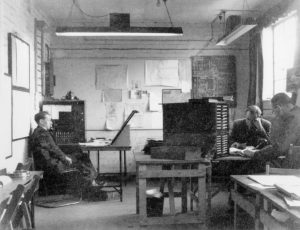This week in The History of AI at AIWS.net – Bletchley Park cryptologists broke the German Enigma code on 9th July, 1941. Alan Turing, considered the founder of computer science and AI, played a vital role in this process in developing the Bombe.
Alan Turing was a British computer scientist and cryptanalyst. He developed the Turing machine, a model of a general-purpose computer, in 1936. During the Second World War, he worked at Bletchley Park (Government Code and Cyper School) as a codebreaker for the United Kingdom. At his time here, he would play a critical role in solving Enigma, Germany’s wartime infamous encryption system. Solving Enigma helped turning the tide of the war in favour of the Allies. After the war, he would go on to develop the Turing test in 1950. Alan Turing is widely considered the father of modern Artificial Intelligence, as well as being highly influential in theoretical computer science. The “Nobel Prize of Computing”, the ACM Turing Award, is named after him.
The History of AI initiative considers this event to be important due to Alan Turing being a pivotal figure in the development of Artificial Intelligence, computing, and machine learning. Furthermore, devices and methods used to help break the code are precursors to computers and AI. Thus, this development in the war is a critical moment in the History of AI.
